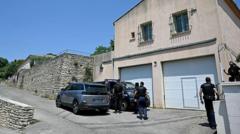In a controversial move to enforce dress code policies, Olabisi Onabanjo University in Ogun State has sparked outrage following the release of a video showing female staff physically checking students for bras as they prepared for exams. Critics have condemned the practice as outdated and invasive, likening it to sexual harassment, while the university’s student leader defended it as necessary for creating a "distraction-free" examination environment.
Outrage Over Controversial Dress Code Enforcement at Nigerian University

Outrage Over Controversial Dress Code Enforcement at Nigerian University
A Nigerian university faces backlash after a viral video showed female students being physically inspected for bras before exams.
The uproar began after footage emerged depicting staff members touching students to ensure compliance with the institution's dress code. Human rights advocates have criticized this method, with Haruna Ayagi from the Human Rights Network stating that it violates students’ rights and opens the university to potential legal action due to unwanted physical contact.
Despite the controversy, student union president Muizz Olatunji insisted that the bra policy was part of an established dress code designed to foster a respectful atmosphere. He stated that the university is exploring alternative means of enforcing these guidelines, recognizing the need for respectful interactions between students and staff. The university's dress code has been upheld since its inception in 1982, with explicit prohibitions against clothing deemed to provoke indecency. The situation reflects broader issues surrounding women's rights and authority in educational institutions across Nigeria.
Despite the controversy, student union president Muizz Olatunji insisted that the bra policy was part of an established dress code designed to foster a respectful atmosphere. He stated that the university is exploring alternative means of enforcing these guidelines, recognizing the need for respectful interactions between students and staff. The university's dress code has been upheld since its inception in 1982, with explicit prohibitions against clothing deemed to provoke indecency. The situation reflects broader issues surrounding women's rights and authority in educational institutions across Nigeria.


















